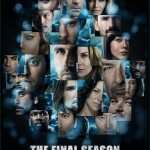 As soon as I learned of the title of Lost’s Season 6 premiere episode last year, I immediately began to wonder about its implications. Sure, the LA X was a reference to LAX, the abbreviation for Los Angeles International Airport where Oceanic Flight 815 was suppose to land, but why was there a space between the “LA” and the “X”? Like everything on Lost, surely this play on letters was for a reason.
As soon as I learned of the title of Lost’s Season 6 premiere episode last year, I immediately began to wonder about its implications. Sure, the LA X was a reference to LAX, the abbreviation for Los Angeles International Airport where Oceanic Flight 815 was suppose to land, but why was there a space between the “LA” and the “X”? Like everything on Lost, surely this play on letters was for a reason.
 I just watched what is quite possibly the most brilliant and hysterically funny movie review I’ve ever seen. This masterpiece critique was created by Mike of Red Letter Media and consists of seven parts that can all be viewed on YouTube. I highly recommend everyone viewing at least the first two parts of his videos, but it will not be necessary to understand what I’m about to say. His analysis brought to the forefront something that I’ve pushed down deep into my psyche for over ten years and am only now ready to release: The Phantom Menace is not only the biggest disappointment in movie history, it is also very likely completely responsible for screwing up our world’s history. Yes, I’m completely serious. Before I begin proving my point, let me begin with some facts that will be a little easier to swallow.
I just watched what is quite possibly the most brilliant and hysterically funny movie review I’ve ever seen. This masterpiece critique was created by Mike of Red Letter Media and consists of seven parts that can all be viewed on YouTube. I highly recommend everyone viewing at least the first two parts of his videos, but it will not be necessary to understand what I’m about to say. His analysis brought to the forefront something that I’ve pushed down deep into my psyche for over ten years and am only now ready to release: The Phantom Menace is not only the biggest disappointment in movie history, it is also very likely completely responsible for screwing up our world’s history. Yes, I’m completely serious. Before I begin proving my point, let me begin with some facts that will be a little easier to swallow.
 Have you ever wondered what would happen if you could go back to a particular moment of your life and do something differently? What if you hadn’t taken a job you’d accepted, married someone you’d broken up with, said “no” when you’d previously said yes…or vice-versa? What if we were all allowed one do-over? Would your life be completely different than it is now, or would events have conspired to put you in pretty much the same place? By continuing to explore the concept of the variable, “Follow the Leader” brings up these very same questions, and if you’ve been paying attention, it’s already given us the answers.
Have you ever wondered what would happen if you could go back to a particular moment of your life and do something differently? What if you hadn’t taken a job you’d accepted, married someone you’d broken up with, said “no” when you’d previously said yes…or vice-versa? What if we were all allowed one do-over? Would your life be completely different than it is now, or would events have conspired to put you in pretty much the same place? By continuing to explore the concept of the variable, “Follow the Leader” brings up these very same questions, and if you’ve been paying attention, it’s already given us the answers.
 At the end of my last column, I asked whether the “variable” would prove to be an event that could change everything. The one thing that could have a domino effect on the outcomes of every event that followed. I wondered if this changeable event is what Ben and Widmore have been fighting for control of. After watching “The Variable,” I have to say “yes,” this is what the term is referring to. However, I’m still not so sure whether the variable will actually vary anything according to the mythology of the show.
At the end of my last column, I asked whether the “variable” would prove to be an event that could change everything. The one thing that could have a domino effect on the outcomes of every event that followed. I wondered if this changeable event is what Ben and Widmore have been fighting for control of. After watching “The Variable,” I have to say “yes,” this is what the term is referring to. However, I’m still not so sure whether the variable will actually vary anything according to the mythology of the show.
 Before I go to sleep at night, sometimes I ask the universe a question about my destiny. The answer, as bizarre as it may seem, usually comes in the form of a song that wakes me up on my clock radio the next morning. While I haven’t done this in awhile, last night I once again had the urge. I asked the universe (God, the light, soul guides, my future self, whatever you wanna call it) what is going to happen on December 22, 2012—the day after the Mayan calendar abruptly ends. The answer I received really surprised me.
Before I go to sleep at night, sometimes I ask the universe a question about my destiny. The answer, as bizarre as it may seem, usually comes in the form of a song that wakes me up on my clock radio the next morning. While I haven’t done this in awhile, last night I once again had the urge. I asked the universe (God, the light, soul guides, my future self, whatever you wanna call it) what is going to happen on December 22, 2012—the day after the Mayan calendar abruptly ends. The answer I received really surprised me.
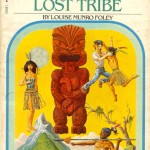 While most mythological stories explore at least one or two truths about the way our world works, Lost is unique in that it explores hundreds of them. It’s almost as if Lost is a spiritual guidebook to life. While I sometimes joke around about it, I’m beginning to truly believe that fans of the show will be better equipped to handle the strange new world we are going to inherit in the upcoming years. Whether consciously or subconsciously, it is almost as if Lost is training us to be able to mentally handle the future. The Good Book says that the meek shall inherit the earth. Perhaps it was referring to Lost geeks.
While most mythological stories explore at least one or two truths about the way our world works, Lost is unique in that it explores hundreds of them. It’s almost as if Lost is a spiritual guidebook to life. While I sometimes joke around about it, I’m beginning to truly believe that fans of the show will be better equipped to handle the strange new world we are going to inherit in the upcoming years. Whether consciously or subconsciously, it is almost as if Lost is training us to be able to mentally handle the future. The Good Book says that the meek shall inherit the earth. Perhaps it was referring to Lost geeks.
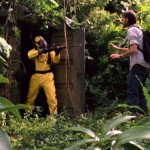 There seems to be a pattern that determines when Locke and the gang are jumping in time on Lost. Whether it’s Richard Alpert telling Locke what to do when he next sees him, or Faraday telling Desmond to find his mother in the future, or Locke telling Alpert to seek him out in a few years once he’s born. So far, the jumps occur whenever a character is talking to another character about events from a different time. Perhaps fate is preventing the characters from knowing something they shouldn’t be privy too or maybe it’s time’s way of course correcting, but I believe there is a deeper reason why the time jumps are happening at that exact moment. And it relates to wisdom we can use in our real lives.
There seems to be a pattern that determines when Locke and the gang are jumping in time on Lost. Whether it’s Richard Alpert telling Locke what to do when he next sees him, or Faraday telling Desmond to find his mother in the future, or Locke telling Alpert to seek him out in a few years once he’s born. So far, the jumps occur whenever a character is talking to another character about events from a different time. Perhaps fate is preventing the characters from knowing something they shouldn’t be privy too or maybe it’s time’s way of course correcting, but I believe there is a deeper reason why the time jumps are happening at that exact moment. And it relates to wisdom we can use in our real lives.
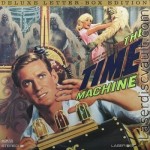
Right from the start of Lost’s fifth season premiere, “Because You Left,” we learn that the island is officially capable of moving through time and space. Time travel has been a theme of Lost since at least Desmond’s mind-flashes during season three, and perhaps as far back as the “Adam and Eve” skeletons of season one. Now however, it has been unequivocally confirmed as a very real, functioning principle within the show’s mythology. Or, has it?
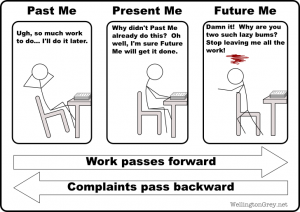 As those of you who had read my last update in March remember, in honor of Desmond’s time traveling abilities, I conversed with both my past and future selves. My future self back then is now my current self. So, let’s see how I did and why I may have fabricated certain answers to my (now) past self.
As those of you who had read my last update in March remember, in honor of Desmond’s time traveling abilities, I conversed with both my past and future selves. My future self back then is now my current self. So, let’s see how I did and why I may have fabricated certain answers to my (now) past self.
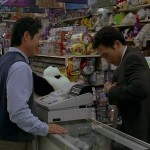 If nothing else, this episode certainly proved that the writers are still at the top of their game, using creative use of flashbacks and flash-forwards to offer an intriguing twist. I also think it gave a lot of weight to “The Myth of Lost” simulation theory, and some of the sub-theories related to it.
If nothing else, this episode certainly proved that the writers are still at the top of their game, using creative use of flashbacks and flash-forwards to offer an intriguing twist. I also think it gave a lot of weight to “The Myth of Lost” simulation theory, and some of the sub-theories related to it.
 As soon as I learned of the title of Lost’s Season 6 premiere episode last year, I immediately began to wonder about its implications. Sure, the LA X was a reference to LAX, the abbreviation for Los Angeles International Airport where Oceanic Flight 815 was suppose to land, but why was there a space between the “LA” and the “X”? Like everything on Lost, surely this play on letters was for a reason.
As soon as I learned of the title of Lost’s Season 6 premiere episode last year, I immediately began to wonder about its implications. Sure, the LA X was a reference to LAX, the abbreviation for Los Angeles International Airport where Oceanic Flight 815 was suppose to land, but why was there a space between the “LA” and the “X”? Like everything on Lost, surely this play on letters was for a reason.
 Have you ever wondered what would happen if you could go back to a particular moment of your life and do something differently? What if you hadn’t taken a job you’d accepted, married someone you’d broken up with, said “no” when you’d previously said yes…or vice-versa? What if we were all allowed one do-over? Would your life be completely different than it is now, or would events have conspired to put you in pretty much the same place? By continuing to explore the concept of the variable, “Follow the Leader” brings up these very same questions, and if you’ve been paying attention, it’s already given us the answers.
Have you ever wondered what would happen if you could go back to a particular moment of your life and do something differently? What if you hadn’t taken a job you’d accepted, married someone you’d broken up with, said “no” when you’d previously said yes…or vice-versa? What if we were all allowed one do-over? Would your life be completely different than it is now, or would events have conspired to put you in pretty much the same place? By continuing to explore the concept of the variable, “Follow the Leader” brings up these very same questions, and if you’ve been paying attention, it’s already given us the answers. At the end of my last column, I asked whether the “variable” would prove to be an event that could change everything. The one thing that could have a domino effect on the outcomes of every event that followed. I wondered if this changeable event is what Ben and Widmore have been fighting for control of. After watching “The Variable,” I have to say “yes,” this is what the term is referring to. However, I’m still not so sure whether the variable will actually vary anything according to the mythology of the show.
At the end of my last column, I asked whether the “variable” would prove to be an event that could change everything. The one thing that could have a domino effect on the outcomes of every event that followed. I wondered if this changeable event is what Ben and Widmore have been fighting for control of. After watching “The Variable,” I have to say “yes,” this is what the term is referring to. However, I’m still not so sure whether the variable will actually vary anything according to the mythology of the show. Before I go to sleep at night, sometimes I ask the universe a question about my destiny. The answer, as bizarre as it may seem, usually comes in the form of a song that wakes me up on my clock radio the next morning. While I haven’t done this in awhile, last night I once again had the urge. I asked the universe (God, the light, soul guides, my future self, whatever you wanna call it) what is going to happen on December 22, 2012—the day after the Mayan calendar abruptly ends. The answer I received really surprised me.
Before I go to sleep at night, sometimes I ask the universe a question about my destiny. The answer, as bizarre as it may seem, usually comes in the form of a song that wakes me up on my clock radio the next morning. While I haven’t done this in awhile, last night I once again had the urge. I asked the universe (God, the light, soul guides, my future self, whatever you wanna call it) what is going to happen on December 22, 2012—the day after the Mayan calendar abruptly ends. The answer I received really surprised me. While most mythological stories explore at least one or two truths about the way our world works, Lost is unique in that it explores hundreds of them. It’s almost as if Lost is a spiritual guidebook to life. While I sometimes joke around about it, I’m beginning to truly believe that fans of the show will be better equipped to handle the strange new world we are going to inherit in the upcoming years. Whether consciously or subconsciously, it is almost as if Lost is training us to be able to mentally handle the future. The Good Book says that the meek shall inherit the earth. Perhaps it was referring to Lost geeks.
While most mythological stories explore at least one or two truths about the way our world works, Lost is unique in that it explores hundreds of them. It’s almost as if Lost is a spiritual guidebook to life. While I sometimes joke around about it, I’m beginning to truly believe that fans of the show will be better equipped to handle the strange new world we are going to inherit in the upcoming years. Whether consciously or subconsciously, it is almost as if Lost is training us to be able to mentally handle the future. The Good Book says that the meek shall inherit the earth. Perhaps it was referring to Lost geeks. There seems to be a pattern that determines when Locke and the gang are jumping in time on Lost. Whether it’s Richard Alpert telling Locke what to do when he next sees him, or Faraday telling Desmond to find his mother in the future, or Locke telling Alpert to seek him out in a few years once he’s born. So far, the jumps occur whenever a character is talking to another character about events from a different time. Perhaps fate is preventing the characters from knowing something they shouldn’t be privy too or maybe it’s time’s way of course correcting, but I believe there is a deeper reason why the time jumps are happening at that exact moment. And it relates to wisdom we can use in our real lives.
There seems to be a pattern that determines when Locke and the gang are jumping in time on Lost. Whether it’s Richard Alpert telling Locke what to do when he next sees him, or Faraday telling Desmond to find his mother in the future, or Locke telling Alpert to seek him out in a few years once he’s born. So far, the jumps occur whenever a character is talking to another character about events from a different time. Perhaps fate is preventing the characters from knowing something they shouldn’t be privy too or maybe it’s time’s way of course correcting, but I believe there is a deeper reason why the time jumps are happening at that exact moment. And it relates to wisdom we can use in our real lives.



